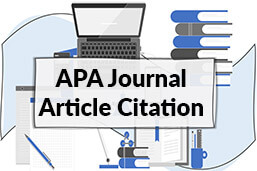
The process of academic writing is deeply interlinked with the practice of citing sources. Proper citation not only lends credibility to a paper but also helps to uphold the principles of intellectual integrity and scholarly ethics. Among the various citation styles available, the APA style is widely used in social sciences, psychology, and education. This article aims to provide an in-depth guide on how to cite journal articles properly in APA style, highlighting the key elements to consider and common mistakes to avoid.
Definition: APA journal article citation
The APA style, short for “American Psychological Association”, is a format used in academic writing. It is often used, but isn’t limited to, in the behavioural sciences. Its latest citation guidelines cover all resource types, both physical and digital, including journals. An APA journal article citation follows strict criteria and must include specific information. This includes the author name(s), publication year, article title, journal title, volume and issue information, page range cited, and, finally, a DOI, digital object identifier. The DOI is one of the most recent additions to the guidelines.
You can find more articles on you to cite in the APA style on our APA examples page.
APA journal article citation basic formatting
There are two aspects to an APA journal article citation. The first is the in-text citation, where you identify the resource quoted or paraphrased. This appears in an author-date format within the text and references a more detailed bibliographical entry found in the later APA reference list.
An APA reference list provides a more thorough APA journal article citation. Here, you must include all published information on the article, including its digital location. Remember the following:
- The article title should appear in plain, sentence text.
- The journal title should appear in italics with major words capitalized (title case).
| APA formatting | Last name, Initials. (Year). Article title. Journal Name, Volume(Issue), Page range. DOI/URL. |
| APA reference list | Schmitts, K. (1994). Theoretical Physics. Science Journal, 99(2), 1-45. |
| APA in-text citation | (Schmitts, 1994). |
Where to find the information
All information required when citing an online journal article will be found on its access page. When saved as a PDF, articles often usually contain all publishing information on the first page, too. The DOI will typically be listed below the page range or within your chosen article database.
DOI or URL?
A DOI is recommended whenever available, as it’s the clearest means of identifying a specific article. If you can’t find a DOI on your chosen database, try another database. Only include the URL in place of a DOI if you retrieved the article directly from the journal’s website. Instead of copying the URL as it appears in your browser, look for the in-journal “share” button for a stable URL. Do not include a URL of a database listing.
APA Journal article citation for unpublished articles
Unpublished journal articles follow a different format, as do unpublished theses and conference papers. Here’s how to create an APA journal article citation for an as-yet unpublished work.
Unpublished article
An unpublished article is anything that has yet to appear online or in print, and is available only directly from the author. Be sure to use reputable sources like established academics. Follow the convention of using “[Unpublished manuscript]” following the title. As it is unpublished, the title appears in italics rather than the journal name. Provide information on university affiliation, where appropriate.
Article submitted for publication
For an article that has been submitted but has yet to be accepted for publication, write “[Manuscript submitted for publication]”. The title again is italicized. Do not include the name of the journal it has been submitted to.
| APA formatting | Last name, Initials. (Year). Article title [Unpublished manuscript]. Department Name, University Name. |
| APA reference list | Dreyfuss, L. (2022). How to cite an unpublished article [Unpublished manuscript]. Citing Department, Oxford University. |
| APA in-text citation | (Dreyfuss, 2022). |
| APA formatting | Last name, Initials. (Year). Article title [Manuscript submitted for publication]. Department Name, University Name. |
| APA reference list | Dreyfuss, L. (2022). How to cite a submitted article [Manuscript submitted for publication]. Citing Department, Oxford University. |
| APA in-text citation | (Dreyfuss, 2022). |
Article in press
For an accepted article that has been submitted and accepted by a journal but is as-yet unpublished, use “in press” in place of the year, followed by the standard journal citation guidelines.
| APA formatting | Last name, Initials. (in press). Article title. Journal Name. |
| APA reference list | Dreyfuss, L. (in press). How to cite an article. Citation Monthly. |
| APA in-text citation | (Dreyfuss, 2022). |
APA journal article citation special issues
To cite an entire special issue rather than an individual article from a journal, use the editor in place of the author.
| APA formatting | Last name, Initials. (Ed. or Eds.). (Year). Title of issue [Special issue name]. Journal Name, Volume(Issue). |
| APA reference list | Dreyfuss, L. (Ed.). (2022). Citing a special issue [All about citation]. Citation Monthly, 11(2). |
| APA in-text citation | (Dreyfuss, 2022). |
FAQs
An APA journal article citation requires the name of the author, followed by the year, article name, journal title, volume information, and page range. It looks much like a book chapter listing in the APA style.
Yes. The latest APA guidelines stress that DOIs should always be provided if they are available. Otherwise, provide an official URL or leave the field blank when using a pre-digital resource.
As with other APA citations, up to 20 authors can be included within the reference list entry. If there are more, you should remove the names before the last author with ellipses to make up 20 authors in total.
No. Unlike some other citation styles, like Harvard, you do not need to include the publication month or season, only the year.
